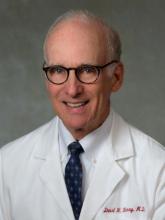Thursday, May 30, 2019
David Cella, PhD, and Lisa Wu, PhD, both of Northwestern University in Chicago, discuss fatigue and sleep disturbance related to cancer – its prevalence and possible treatments -- in this episode of Blood & Cancer.
In Clinical Correlation (29:45), Ilana Yurkiewicz, MD, of Stanford (Calif.) University, shares a case that highlights the resilience that patients show in the face of cancer, and asks: Can a positive attitude improve outcomes?
Show notes
By Hitomi Hosoya, MD, PhD, resident in the department of internal medicine, University of Pennsylvania, Philadelphia
- Cancer-related fatigue is prevalent in cancer patients and cancer survivors.
- Sleep disturbance also is prevalent in this population and can be related to fatigue.
- In breast cancer patients, for instance, fatigue during treatment can be as high as 80%.
- Even after 7-9 years of treatment, more than 50% of breast cancer patients reported sleep disturbances, according to one study.
- Cancer-related fatigue is different from usual daily fatigue; it is more severe, more distressing, and not relieved by rest.
- Cancer-related fatigue and sleep disturbance are thought to be related to pro-inflammatory cytokines, endocrine dysfunction, and possibly to circadian rhythm.
- Cancer-related fatigue should be evaluated from treatment regimen perspectives, metabolic perspectives, or other underlying medical problems.
- If the above conditions are ruled out, psychosocial therapy (exercise, cognitive behavioral therapy) should be considered.
- Recently, light therapy using broad-spectrum bright light to correct circadian rhythm has been studied.
- The gold standard treatment for sleep issues in cancer is cognitive behavioral therapy for insomnia.
How to Listen
Podcast Participants
David Henry, MD, FACP, is a clinical professor of medicine at the University of Pennsylvania and vice chairman of the department of medicine at Pennsylvania Hospital in Philadelphia. He received his bachelor’s degree from Princeton University and his MD from the University of Pennsylvania, then completed his internship, residency, and fellowship at the Hospital of the University of Pennsylvania. After 2 years as an attending in the U.S. Air Force, he was drawn to practicing as a hem-onc because of the close patient contact and interaction, and his belief that, win or lose with each patient, one can always make a difference in their care and lives. Follow Dr. Henry on Twitter: @davidhenrymd. Dr. Henry reported being on the advisory board for Amgen, AMAG Pharmaceuticals, and Pharmacosmos. He reported institutional funding from the National Institutes of Health and FibroGen.

